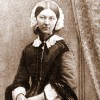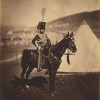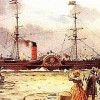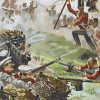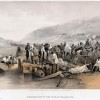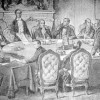Crimean War
Created by Dino Franco Felluga on Tue, 04/07/2020 - 11:44
Part of Group:
Here is a sample timeline on the Crimean War that I built within minutes using COVE tools.
Timeline
Chronological table
| Date | Event | Created by | Associated Places | |
|---|---|---|---|---|
| 12 May 1820 |
Birth of Florence Nightingale
ArticlesLara Kriegel, “On the Death—and Life—of Florence Nightingale, August 1910″ Related Articles |
Dave Rettenmaier | ||
| 2 Oct 1853 to 30 Mar 1856 |
Crimean War
ArticlesStefanie Markovits, "On the Crimean War and the Charge of the Light Brigade" |
Dave Rettenmaier | ||
| 1854 |
Cunard mail ships requisitioned for Crimean War
Related Articles |
Dave Rettenmaier | ||
| 28 Mar 1854 |
Britain declares war against RussiaOn 28 March 1854, Britain declares war against Russia, thus entering the Crimean War. Image: Russo-British skirmish during Crimean War (anonymous plate). This image is in the public domain in the United States because its copyright has expired. In 1854, in defense of the Turks and of British access to eastern trade routes, Britain entered into war in the Crimea. The two-year campaign represented the nation’s first major military engagement since the end of the Napoleonic wars. It thus sheds light on mid-Victorian attitudes towards national identity, offering a counter-narrative to views of the 1850s dominated by responses to the Great Exhibition of 1851. As literary and visual representations of the war reveal, reactions to this conflict were both more nuanced and more ambivalent than our preconceptions about Victorian jingoism might anticipate. ArticlesStefanie Markovits, "On the Crimean War and the Charge of the Light Brigade" |
Dave Rettenmaier | ||
| 25 Oct 1854 |
Charge of the Light BrigadeOn 25 October 1854, British forces undertook the charge of the Light Brigade at the Battle of Balaklava. Image: Tinted lithograph showing the embarkation of sick persons at the harbor in Balaklava" (William Simpson, artist; Paul & Dominic Colnaghi & Co., publishers, 24 April 24 1855). This image is available from the United States Library of Congress's Prints and Photographs division under the digital ID ppmsca.05686. The image is in the public domain in the United States because its copyright has expired. No other engagement of the war has stuck so vividly in the popular consciousness, aided by Tennyson's poem of the same name, by far the best-remembered cultural product of the war. On the morning of October 25th, 1854, over six hundred British men rode the wrong way down a “valley of death” (so christened first by The Times and later by Tennyson) as enemy guns attacked from all sides. Not two hundred made it out alive. The charge resulted from a series of miscommunications between Lord Raglan, the Commander-in-Chief of the British Forces, and Lord Lucan, the Commander of the Cavalry. Both Tennyson’s poem and many other contemporary responses to the charge suggest that reactions to this event were deeply conflicted, expressing real bewilderment about how to integrate it into preexisting models of patriotic feeling. Moreover, a new form of heroism grew out of the bewildering experience of the Light Brigade’s defeat—and a new sense of a national identity that was based in part on this new heroism. ArticlesStefanie Markovits, "On the Crimean War and the Charge of the Light Brigade" |
Dave Rettenmaier | ||
| 4 Nov 1854 |
Florence Nightingale landed at Scutari
ArticlesLara Kriegel, “On the Death—and Life—of Florence Nightingale, August 1910″ Related ArticlesStefanie Markovits, “On the Crimean War and the Charge of the Light Brigade” |
Dave Rettenmaier | ||
| 30 Mar 1856 |
Treaty of ParisOn 30 March 1856, signing of the Treaty of Paris, ending the Crimean War. Image: Treaty of Paris, the participants (Contemporary woodcut, published in Magazin Istoric, 1856). This image is in the public domain in the United States because its copyright has expired. ArticlesStefanie Markovits, "On the Crimean War and the Charge of the Light Brigade" |
Dave Rettenmaier | ||
| 1 Aug 1910 |
Death of Florence Nightingale
ArticlesLara Kriegel, “On the Death—and Life—of Florence Nightingale, August 1910″ |
Dave Rettenmaier |

